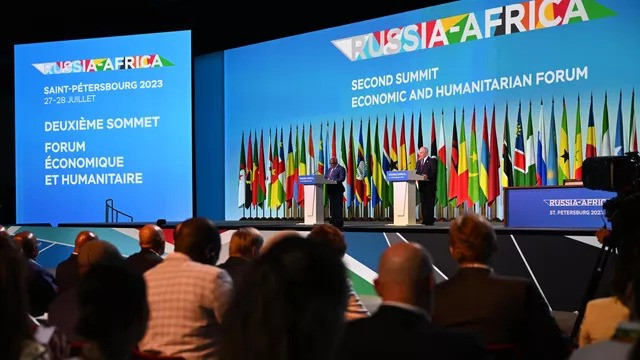At the conference, Russian President Vladimir Putin stated that Moscow is greatly interested in promoting close cooperative relations with Africa in various fields, and pledged to support multi-sectoral activities of the African Union (AU) to ensure the continent’s peace and stability, as well as expand its political and economic integration.
The partnership between Russia and Africa was noted by Russian President Putin as having deep roots, characterised by stability, trust and goodwill. The two sides share a desire to form a system of relations based primarily on international law that takes into account national interests, indivisible security and the central coordinating role of the United Nations.
The Russian leader emphasised that Russia has always demonstrated its support for the African people in the previous struggle for national liberation.
At the meeting with leaders of regional organisations in St Petersburg, President Putin affirmed that Africa is one of Russia's main partners and that the two sides can further strengthen their cooperation in creating a regular consultation mechanism on key issues such as countering terrorism and extremism, ensuring food supplies, information and environmental security.
Bilateral trade between Russia and African countries reached 18 billion USD in 2022. The Russian leader affirmed that Russia would continue to increase trade cooperation and promote the potential of the economic partnership between the two sides. The two sides have also made progress in agricultural, energy and industrial cooperation, with more than 30 joint energy projects underway in 16 African countries.
As a region particularly vulnerable to climate change but with few resources to adapt to increasingly extreme weather conditions, Africa needs financial and technological support from Russia. Increasing the production and use of clean energy, while continuing to develop the economy, is currently a top priority for African countries in their efforts to combat climate change, and this is an area that can receive significant support from Russia.
One of the important issues prioritised for discussion by the two sides is Russia's food supply to African countries. Last year, Russia exported 11.5 million tonnes of grain to Africa and the figure in the first six months of 2023 was nearly 10 million tonnes, despite Western sanctions against Moscow.
The Russian side said it would continue to provide complimentary grain to African countries in the coming time. In his speech at the plenary session of the Russia-Africa Summit, President Putin said that in the coming months, Russia is ready to supply African countries with 25,000-50,000 tonnes of grain.
Direct food aid from Russia will help African countries alleviate their worry about the impact of global supply disruptions on food security in the continent, where many are on the brink of severe famine. The establishment of logistics corridors and transhipment hubs not only for food and fertilisers but also all other goods produced in Russia, was one of the topics discussed at the summit.
Russia believes that the Black Sea grain deal, from which Russia has just withdrawn, has not helped reduce hunger in Africa as originally promised, because only a small portion of the grain exported from Ukraine under the agreement is shipped to poor countries in Africa.
Meanwhile, Africa, which has always been a “destination” for cooperation and investment of world powers, is also a highly potential market for Russia. As the US and its Western allies are imposing sanctions on Russia, African countries offer a window for cooperation and new opportunities for Russia.
President Putin highlighted the importance of financial cooperation and affirmed that it is necessary to switch to payment in national currencies in bilateral trade between Russia and African countries, thereby facilitating cross-border payments, despite restrictions in Western systems.
















